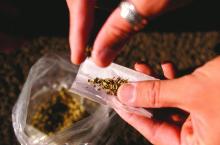BALTIMORE – Although the national trend of legalization of marijuana for medical and recreational uses has accelerated, physicians should be cautious about prescribing , a sleep specialist told attendees at the annual meeting of the Associated Professional Sleep Societies.
“Increased legalization of medical marijuana may cause reduction in perception of the risk of potential harm” said Ashima Sahni, MD, of Northwestern University, Chicago.
She noted the long-term implications of marijuana use have been documented, including decreased cognition, lack of motivation, and psychotic effects. Marijuana also appears to affect sleep, although most studies were done in the 1970s and showed mixed results, she said.“Overall the consensus is that the short-term use of medical marijuana causes an increase in slow-wave sleep (SWS), a decrease in sleep onset latency, a decrease in wake after sleep onset (WASO) and a decrease in REM sleep,” Dr. Sahni said. But chronic use decreases SWS and results in inconsistencies in REM sleep patterns and sleep fragmentation. These changes lead to a self-perpetuating negative cycle that causes chronic users to progressively increase their intake, furthering sleep disruption, she noted.
Marijuana withdrawal also can cause significant disturbances in sleep patterns, including reduced total sleep time and SWS, increased WASO, increased REM sleep associated with strange dreams, and increased limb movements during sleep, Dr. Sahni said. “The effects can be seen as early as 24 hours after discontinuation and can last as long as 6 weeks,” she said. In addition, poor sleep quality prior to a withdrawal attempt has been linked to relapse (Am J Psychiatry. 2004;161:1967-77).
The use of medical marijuana in the management of sleep disorders is fraught with controversy, Dr. Sahni said. She reviewed studies investigating the use of dronabinol for obstructive sleep apnea (OSA). “This is not medical marijuana,” Dr. Sahni said. “It’s a synthetic tetrahydrocannabinol (THC) cannabinoid, which acts on the nonselective CB1 and CB2 agonists,” she said. THC is the euphoria-inducing compound in marijuana. While the mechanism of action of dronabinol is similar to marijuana, the pharmacokinetics may differ. Dronabinol has been approved by the Food and Drug Administration for cancer-related nausea and appetite stimulation in AIDS patients. She referred to a proof-of-concept study of 17 patients with OSA in which dronabinol reduced the apnea-hypopnea index (AHI) with no degradation of sleep architecture or serious adverse events (Front Psychiatry. 2013 Jan 22;4:1-5). Dr. Sahni also noted a randomized, placebo-controlled trial of 73 patients that reported an average reduction in AHI of 12.9 (Sleep. 2018 Jan 1;41[1]; doi: 10.1093/sleep/zsx184). But she pointed out that the American Academy of Sleep Medicine does not recommend medical cannabis or its synthetic extracts for treatment of OSA (J Clin Sleep Med. 2018 Apr 15;14:679-81).
Insomnia, on the other hand, represents the most common use of medical marijuana for sleep. “Studies have shown mixed results because of differences in the ratios of THC to CBD [corticobasal degeneration] in the forms of marijuana examined,” she said. “In the short term, subjective sleepiness is reported to be better, but then the self-perpetuating negative cycle initiates with chronic long-term use.”


